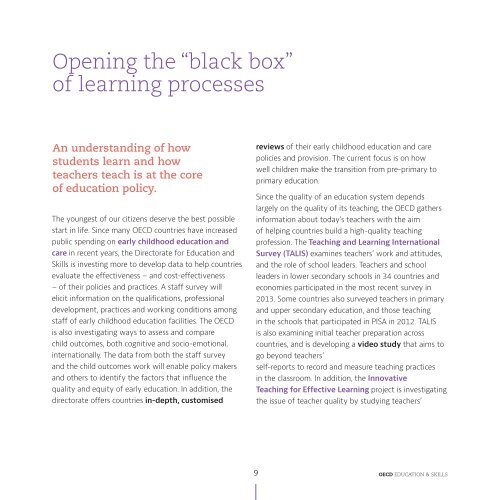Directorate-for-education-and-skills-brochure.pdf?utm_content=bufferf4a33&utm_medium=social&utm_source=twitter
Directorate-for-education-and-skills-brochure.pdf?utm_content=bufferf4a33&utm_medium=social&utm_source=twitter
Directorate-for-education-and-skills-brochure.pdf?utm_content=bufferf4a33&utm_medium=social&utm_source=twitter
You also want an ePaper? Increase the reach of your titles
YUMPU automatically turns print PDFs into web optimized ePapers that Google loves.
Opening the “black box”of learning processesAn underst<strong>and</strong>ing of howstudents learn <strong>and</strong> howteachers teach is at the coreof <strong>education</strong> policy.The youngest of our citizens deserve the best possiblestart in life. Since many OECD countries have increasedpublic spending on early childhood <strong>education</strong> <strong>and</strong>care in recent years, the <strong>Directorate</strong> <strong>for</strong> Education <strong>and</strong>Skills is investing more to develop data to help countriesevaluate the effectiveness – <strong>and</strong> cost-effectiveness– of their policies <strong>and</strong> practices. A staff survey willelicit in<strong>for</strong>mation on the qualifications, professionaldevelopment, practices <strong>and</strong> working conditions amongstaff of early childhood <strong>education</strong> facilities. The OECDis also investigating ways to assess <strong>and</strong> comparechild outcomes, both cognitive <strong>and</strong> socio-emotional,internationally. The data from both the staff survey<strong>and</strong> the child outcomes work will enable policy makers<strong>and</strong> others to identify the factors that influence thequality <strong>and</strong> equity of early <strong>education</strong>. In addition, thedirectorate offers countries in-depth, customisedreviews of their early childhood <strong>education</strong> <strong>and</strong> carepolicies <strong>and</strong> provision. The current focus is on howwell children make the transition from pre-primary toprimary <strong>education</strong>.Since the quality of an <strong>education</strong> system dependslargely on the quality of its teaching, the OECD gathersin<strong>for</strong>mation about today’s teachers with the aimof helping countries build a high-quality teachingprofession. The Teaching <strong>and</strong> Learning InternationalSurvey (TALIS) examines teachers’ work <strong>and</strong> attitudes,<strong>and</strong> the role of school leaders. Teachers <strong>and</strong> schoolleaders in lower secondary schools in 34 countries <strong>and</strong>economies participated in the most recent survey in2013. Some countries also surveyed teachers in primary<strong>and</strong> upper secondary <strong>education</strong>, <strong>and</strong> those teachingin the schools that participated in PISA in 2012. TALISis also examining initial teacher preparation acrosscountries, <strong>and</strong> is developing a video study that aims togo beyond teachers’self-reports to record <strong>and</strong> measure teaching practicesin the classroom. In addition, the InnovativeTeaching <strong>for</strong> Effective Learning project is investigatingthe issue of teacher quality by studying teachers’9OECD EDUCATION & SKILLS


